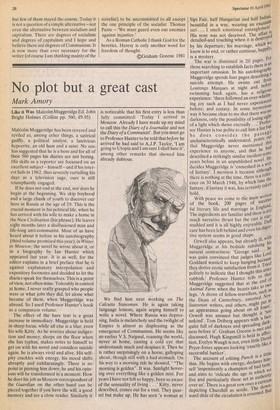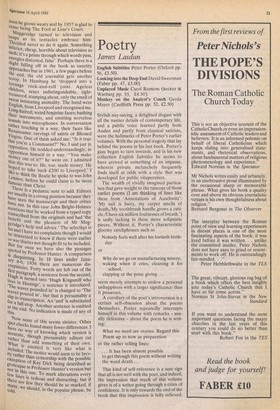No plot but a great cast
Mark Amory
Like it Was Malcolm Muggeridge Ed. John Bright Holmes (Collins pp. 560, £9.95) Malcolm Muggeridge has been revered and reviled as, among other things, a satirical gadfly, a political analyst, a lascivious hypocrite, an old ham and a saint. No one has suggested that he is a bore and for all of their 560 pages his diaries are not boring. His skills as a reporter are focussed on an excellent subject — himself — and if his interest fails in 1962, thus severely curtailing his days as a television sage, ours is still triumphantly engaged.
If he does not end at the end, nor does he begin at the beginning. We skip boyhood and a large chunk of youth to discover our hero in Russia at the age of 29. This is the crucial moment in his political life, when he has arrived with his wife to make a home in the New Civilisation (his phrase). He leaves eight months later a disillusioned man and life-long anti-communist. Most of us have heard about it before in his autobiography (third volume promised this year), in Winter in Moscow, the novel he wrote about it, or in a biography by. Ian Hunter which appeared last year. It is as well, for the editor explains in a brief preface that he is against explanatory interpolation and expository footnotes and decided to let the diaries speak for themselves. This is a point of view, not often mine. Tolerably in control at home, I never really grasped who people were or what jobs they did, let alone what became of them, when Muggeridge was abroad. So I used Professor Hunter's book as a companion volume.
The effect of the bare text is a great increase in immediacy. Muggeridge is held in sharp focus, while all else is a blur, even his wife Kitty. As he worries about indigestion and money, sleeps on the floor when she has typhus, makes notes to himself to get on with his novel and considers suicide again, he is always vivid and alive. His selfpity crackles with energy, his mood shifts abruptly and exhilaratingly. There is no !
point in pinning him down; he and his opinions will be transformed in a moment. How he does his job as Moscow correspondent of the Guardian on the other hand can be pieced together if you have the will, a good memory and are a close reader. Similarly it is noticeable that his first entry is less than fully committed: 'Today I arrived in Moscow. Already I have made up my mind to call this the Diary of a Journalist and not the Diary of a Communist'. But you must go to Professor Hunter to be told that before he arrived he had said to A.J.P. Taylor, 'I am going to Utopia and I am sure I shall hate it', among other remarks that showed him already dubious.
We find him next Working on The Calcutta Statesman. He is again taking language lessons, again urging himself to write a novel. Where Russia was depressing, India is melancholy and the twilight of Empire is almost as displeasing as the emergence of Communism. He seems like an earlier V.S. Naipaul, roaming the world, never at home, casting a cold eye that understands much and despises it. Then he is rather surprisingly on a horse, galloping about, though still with a bad stomach. On his way to a morning ride he shouted, "The morning is golden". It was. Sunlight hovering over everything like a golden mist. For years! have not felt so happy, been so aware of the sensuality of living. . .' Kitty, never described, comes out for a visit. They quarrel but make up. He has seen 'a woman at Spectator 18 April 1981 Sipi Fair, half Hungarian and half Indian, beautiful in a way, wearing an excltlisii,e His nose was not deceived. The affair is, by his departure; his marriage, which we know is to end, or rather continue, hafWilY' sari ... I smelt emotional entanglement detailed-and touching when it is destroYe° is a mystery. The war is dismissed in 20 pages. Ft/r those searching to establish facts there iS all important omission. In his autobiograPhY Muggeridge spends four pages describing ti suicide attempt. He swims out fr°i11 Lourengo Marques at night and, before swimming back again, has a religions experience: 'there followed an over-wheini,.' ing joy such as I had never experience' before; and ecstasy. In some mYsterie„ti,s way it became clear to me that there was darkness, only the possibility of losing sig"' of a light which shone eternally. ...' Pref,.e„s; ,sor Hunter is too polite to call him a liar he does consider the passaget uncharacteristically understated, points °,11;, that Muggeridge never mentioned tit'ci experience to anyone, and that he ha described a strikingly similar incident some years before in an unpublished novel. Ole) decides Muggeridge is 'enmeshed in a web of fantasy'. I mention it because althong there is nothing at the time, there is a refer ence on 30 March 1946, by which time the fantasy, if fantasy it was, has certainly taker/ h id . With peace we come to the main section of the book, 200 pages of successful literary life and marriage in Engialidi The ingredients are familiar and there is r10 much narrative thrust but the cast is stari studded and it is all highly enjoyable. Pit' care has been left behind and even his digestive system seems in good shape. Orwell also appears, but already ill, with Muggeridge at his bedside subduing hi! natural contrariness: 'George said was quite convinced that judges like Lor Goddard wanted to keep hanging hecalbcj they derive erotic satisfaction from it. Trie politely to indicate that I thought this titte'', rubbish.' Professor Hunter tells us thalf Muggeridge suggested that at the end ° Animal Farm when the beasts take to two legs, 'A drove of fellow-travellers, such as the Dean of Canterbury, assorted Nei's' Statesman writers, and others, might put 111, an appearance going about on all fours Orwell was amused but thought unkind'. Tom Driberg appears with 'a faCj quite full of darkness and spreading dar!",, ness before it'. Graham Greene is met anu. discussed, Hugh Kingsmill is held in affec.A tion, Evelyn Waugh is not, even little Dav1"8 Pryce-Jones appears looking 'exactly like successful banker'. The account of editing Punch is a little_ thin. He begins with energy, declares hirn, self 'impenitently a champion of bad taste and aims to 'ridicule the age in which w..e live and particularly those set in auth°1'ILY.over us'. There is a great row over a eartoot : depicting Churchill as senile. The t'w/lt ward slide of the circulation is reversed. f3ti soon he grows weary and by 1957 is glad to cease being The Fool at Lear's Court. Muggeridge turned to television and Snaps as its tentacles embrace him: 'Decided never to do it again. Something inferior, cheap, horrible about television as such; it's a prism through which words pass, i energies distorted, false'. Perhaps there s a Slight falling off in the book as sanctity approaches but in 1961, a few pages before the end, the old journalist gets another scoop. In Hamburg he 'dropped into a teenage rock-and-roll joint. Ageless children, sexes indistinguishable, tighttrousered, stamping about, only the smell of sweat intimating animality. The band were ,E'n8lish, from Liverpool and recognised me. Long-haired; weird feminine faces; bashing their instruments, and emitting nerveless sounds into microphones. In conversation rather touching in a way, their faces like Renaissance carvings of saints or Blessed Virgins. One of them asked me: "Is it true that you're a Communist?" No, I said just in ePPosition. He nodded understandingly; in ePPosition himself in a way. "You make money out of it?" he went on. I admitted that this was so. He, too, made money. He hoped to take back £200 to Liverpool.' I like to think the Beatle he spoke to was John Lennon, before he could claim to be more famous than Christ. There is a pedantic note to add. Editors are usually in a strong position because they have seen the manuscript and their critics have not. In this case John Bright-Holmes mentions that he worked from a typed copy transcribed from the originals and had 'the benefit and the pleasure of Mr Mugg, erldge's help and advice.' The selectiqn is als a. nd I have no complaints though I would be Interested to know if there were earlier or war diaries not thought fit to be included. But for once we have also the passages 9-noted by Professor Hunter. A comparison Is disquieting. In 18 lines under January 4-6, 1936 there are numerous diserePancies. Forty words are left out of the first paragraph, a sentence from the second, Hugh is turned into 'Hugh Kingsmill who ‘1..,,w,es in Hastings', a sentence is introduced. The waves pounded in' is changed to 'The waves poured in', but that is presumably a .
for transcription, An 'and' is substituted _°,1. a full stop. Another sentence is omitted at the end. No indication is made of any of this Now none of this seems sinister. Other Spot checks found many fewer differences.I i have no way of knowing which version s accurate, though presumably editors cut rather than add something of their own. What is omitted is very like what is included. The motive would seem to be brevity rather than censorship with the possible exception of .Kay Dick being described as grote i sque in Professor Hunter's version but not n this one. To mark alterations every few lines is tedious and distracting; but if ere are few they should be so marked, if many, we should, in the popular phrase, be told.







































 Previous page
Previous page